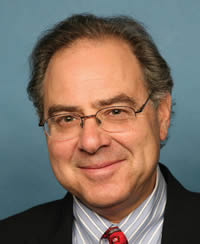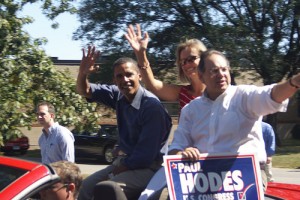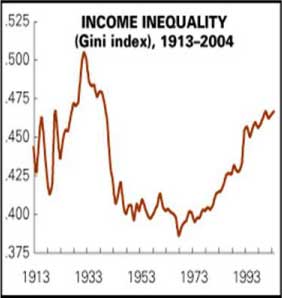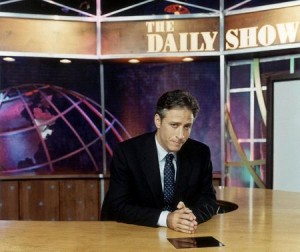 I first ran for office as an ordinary citizen from New Hampshire in 2004. My hope when I ran was to help change the course of the nation and to effectively represent the people of my state with independence, integrity and imagination. I was fortunate to meet those goals before joining the ranks of The Recovering Politician.
I first ran for office as an ordinary citizen from New Hampshire in 2004. My hope when I ran was to help change the course of the nation and to effectively represent the people of my state with independence, integrity and imagination. I was fortunate to meet those goals before joining the ranks of The Recovering Politician.
I was part of a historic new majority in the House of Representatives and was chosen by my peers as President of the Freshman Class of 2006. I served on the Oversight and Government reform committee and the Financial Services committee during a period of unprecedented activity.
 As a freshman congressman from the first in the nation primary state, I was courted by Presidential candidates. I believed that the wave of change that swept me into office was not finished and that business as usual in Washington needed some shaking up. Against all odds, I decided to support a long-shot candidate for whom change was a theme, Barack Obama. I had the honor of serving as a national co-chair for the President’s first campaign.
As a freshman congressman from the first in the nation primary state, I was courted by Presidential candidates. I believed that the wave of change that swept me into office was not finished and that business as usual in Washington needed some shaking up. Against all odds, I decided to support a long-shot candidate for whom change was a theme, Barack Obama. I had the honor of serving as a national co-chair for the President’s first campaign.
The wave elections of 2006 and 2008 were countered by the tsunami of 2010 when I decided not to run for my congressional seat; instead I ran, unsuccessfully, for the United States Senate. Politics has a lot to do with timing and luck. You can’t surf a tsunami. As a musician I should know a bit about timing. Suffice it to say, I had quite a while to confront the idea of political afterlife while I ran for the Senate, a tremendous experience nonetheless.
 Today, from my old office chair in my new consultancy office at Northern Connection, LLC, I have a few thoughts to share.
Today, from my old office chair in my new consultancy office at Northern Connection, LLC, I have a few thoughts to share.
First, I am constantly struck by the kindness of the citizens of New Hampshire who have approached me in large numbers to thank me for my service. Some call me Senator, some call me Congressman, some look at me and say “Don’t I know you from somewhere?” In today’s celebrity obsessed culture I suppose I qualify as some sort of minor local celebrity. At least I can go out to eat with my wife and not feel obliged to get up and shake every single hand in the restaurant, which is de rigeur in New Hampshire retail politics.
Second, I am struck by the simple pleasures of weekends. It has been years since I had weekends. To be fair, while the rush of political adrenalin has mostly drained away, I’m still sometimes fidgety on weekends. Shouldn’t I be rushing off to an event, raising money, gripping and grinning? I feel a little like someone in a twelve step program, addicted to politics at the core and taking it day by day. I’m enjoying breathing, reacquainting myself with yard work and the hardware store, seeing friends and family, playing my guitar.
Folks say I look great. My marriage survived and actually thrived, but now it’s even better. As a recovering politician, I can say there is life after politics.
Yet, my recovery is clearly incomplete. I have not lost my deep commitment to making our country a better place, a fairer, more tolerant, more prosperous place with a secure future. I want to live in a country with good jobs, better schools, and a thriving economy.
As I see it, two overarching issues have fundamentally changed the world in which we live and must be accounted for in working to accomplish the fundamental change we need in our politics and the progress we strive to make in our country.
These two issues are certainly not the only critical issues we face but, in my judgement, they underlie and drive many others.
 First, across the planet, there has never been greater disparity between the wealth and income of those who have and those who do not. This is true not only in the United States, but also in many other countries both developed and under-developed. The growing wealth disparity is a driver of turmoil and disequilibrium. To the positive, one might view the recent events in the Middle East as positive though tumultuous reactions to the issue as repressed populations confront the arrogance of dictatorships. The results and consequences are as yet uncertain but surely, brutal repression will prove ineffective in the long run to contain the democratic aspirations of a people. Our own history proves that point.
First, across the planet, there has never been greater disparity between the wealth and income of those who have and those who do not. This is true not only in the United States, but also in many other countries both developed and under-developed. The growing wealth disparity is a driver of turmoil and disequilibrium. To the positive, one might view the recent events in the Middle East as positive though tumultuous reactions to the issue as repressed populations confront the arrogance of dictatorships. The results and consequences are as yet uncertain but surely, brutal repression will prove ineffective in the long run to contain the democratic aspirations of a people. Our own history proves that point.
In this country, the recent financial collapse has exposed the fundamental weaknesses in our economic infrastructure. Record unemployment, soaring deficits and a battered middle-class losing hope for the future should drive the national political discourse and serve to illuminate the fundamental ideological differences between the parties which must be reconciled and balanced to create real solutions.
Second, we cannot fully appreciate the significance of the information revolution and its impact on politics and society.
Here at home our political system is gridlocked by the money pouring into it and the time politicians must spend raising it to communicate. The internet has democratized politics but also serves to amplify the voices of extremism and disinformation.
 The deficit of adult political dialogue and the reduction of debate to crass sloganeering are seemingly decried by the populace, and the pundits. But a 24/7 news cycle and the recent phenomenon of news as “infotainment” need conflict not conciliation to sell ad time and attract viewers. Who could have ever predicted that we would get so much of our information about current events from shows on Comedy Central and what does that say about our politics? We are caught in a world of information overload. Instant personal communication has eroded the patience for reflection and study both by voters and their representatives.
The deficit of adult political dialogue and the reduction of debate to crass sloganeering are seemingly decried by the populace, and the pundits. But a 24/7 news cycle and the recent phenomenon of news as “infotainment” need conflict not conciliation to sell ad time and attract viewers. Who could have ever predicted that we would get so much of our information about current events from shows on Comedy Central and what does that say about our politics? We are caught in a world of information overload. Instant personal communication has eroded the patience for reflection and study both by voters and their representatives.
It is a challenging political environment in which to grapple effectively as a nation with the great issues We must creating new jobs in a changed world to sustain our middle class. It’s important that “Made in America” means something in a more competitive global economy. But the jobs we have lost are not coming back in their old form. I believe that one of government’s essential purposes is to give a hand up and not a hand-out to those who need society’s help; the poor, the sick, the young, the old. I am a private citizen today because, in large part, I voted for health insurance reform. In a civilized society, I believe health care is a right not a privilege for those who can afford it. We must fund investments in innovation and infrastructure. We can continue to lead in a dangerous world with our aspirational values while maintaining a strong, more cost-effective, modern defense for greater security.
For now, in private life, I need some time to breathe more easily and recharge my batteries.
I just celebrated my 60th birthday. I look forward to providing sage advice and counsel to those who must navigate the reefs and shoals of Washington. I am grateful for the honor of serving and also loving my weekends again. I’m on the way to recovery and renewal.









Leave a Reply